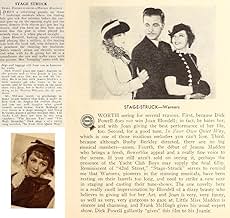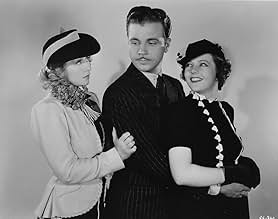Aggiungi una trama nella tua linguaBroadway dance director George Randall (Dick Powell) is stuck with staging a Broadway show starring Peggy Revere (Joan Blondell), a wealthy but untalented performer who is starring only beca... Leggi tuttoBroadway dance director George Randall (Dick Powell) is stuck with staging a Broadway show starring Peggy Revere (Joan Blondell), a wealthy but untalented performer who is starring only because she is backing the show. Tempers flare during rehearsals, but suave producer Fred Harr... Leggi tuttoBroadway dance director George Randall (Dick Powell) is stuck with staging a Broadway show starring Peggy Revere (Joan Blondell), a wealthy but untalented performer who is starring only because she is backing the show. Tempers flare during rehearsals, but suave producer Fred Harris (Warren William) smooths things over by pretending to each combatant that each one secr... Leggi tutto
- Regia
- Sceneggiatura
- Star
- Premi
- 1 vittoria in totale
- Oscar Freud
- (as Johnnie Arthur)
- Dr. Stanley
- (as Thomas Rogue)
- Heney
- (as Ed. Chandler)
Recensioni in evidenza
It's very hard, however, to believe that this one ever got any raves--and, indeed, Jeanne Madden in real life made two more pictures, then dropped from sight. With her pinched voice, crinkly-faced wholesome looks, and complete lack of sex appeal, she's another Janet Gaynor--of whom one was more than enough. Joan Blondell, usually a reason to cheer up, mugs and clowns to a degree that would be over the top in a revue sketch--she's supposed to be a Park Avenue socialite but makes the role into that of a common, vulgar girl pretending to be one.
Dick Powell, tricked out with an imitation Don Ameche look, seems to be pretending to be somewhere else.
Warren William plays ego-maniacal producer Fred Harris which is also a takeoff of producer Jed Harris. Legend has it that Jed Harris was as full of tricks and deviltry that Warren William's character in Stagestruck is. It's very similar to the John Barrymore character in 20th Century. In fact looking at William's profile it's like looking at a poor man's Barrymore. But that is unfair because Warren William did a lot of good work on screen.
Dick Powell is the director here and he gets a couple of good songs to sing. Mostly he has to act annoyed at Blondell and falling for newcomer Jeanie Madden. Since Powell and Blondell got married right after this film, that may have been the biggest performance in the movie.
Jeanie Madden was the love interest. Ruby Keeler had departed Warner Brothers so Powell got a new Ruby, a singing Ruby. Ruby Keeler's singing voice was as flat as her dramatic delivery. Madden couldn't dance, but she sang beautifully especially in the duet with Powell, Fancy Meeting You. But her acting was as bad as Ruby's and she was gone after two more films.
There was a quartet in the film called the Yacht Club Boys and they had a couple of funny bits, especially one in Warren William's office where William plays a straight man for them (and looks like he's having a ball doing it). I suppose they were too similar in style to the Ritz Brothers over at 20th Century Fox so they were gone after this film.
It's a funny film on its own merits, but unless you know who Peggy Hopkins Joyce and Jed Harris were, a lot of the lines will be lost on you.
It's a slightly off-key Warner Brothers musical that wants to be a screwball comedy, with director Powell fending off wacky relatives and the advances of untalented diva Blondell, while producer William employs Freudian psychology to unite the mismatched pair, while Powell pursues an on-again-off-again-on-again romance with maddeningly fresh-faced ingenue Madden. (Her flat line readings make Ruby Keeler sound like Bette Davis.) Oh, the Yacht Club Boys are in it, too, with two endless specialty numbers that may have had resonance in 1936 -- one's about income taxes, the other about physical culture -- but their forced goofiness has dated badly.
Most surprisingly, despite the Berkeley imprimatur, there are no production numbers here; Warners, one has to assume, was on a budget binge. So the saving graces are the nice Arlen/Harburg songs, and Blondell, in an uncharacteristically broad and unsympathetic role. You don't believe her for a moment, yet she's terrific, batting her eyes and flashing her teeth and cavorting like an over-the-top Carole Lombard. This lady could do anything, but she doesn't really save this all-too-middling musical.
Busby Berkeley is the director. I expected a fun behind the scenes of a Broadway show with big song and dance numbers. I would have preferred not stopping the show in the first half and having the two leads battling it out while falling in love. That seems to be the simpler and best story. George and Ruth have good chemistry. I like sending her away to the flower shop. I do like their story, but they're not the star pairing. Joan Blondell is the star. She's meant to be funny, but she is annoying and wasting time. There are some moments to like, but this is problematic.
Following the pattern of other earlier 1933 hits, 42nd STREET and FOOTLIGHT PARADE, Joan Blondell is featured as blinky-eyed Peggy Revere, a temperamental actress with a bad reputation with men (she shoots them, but only giving her victims flesh wounds); Warren William as a smooth-talking promoter, Fred Harris, who tries to get George and Peggy on friendly terms; Frank McHugh as Sid, the harassed assistant dance director typically calling out, "Quiet!" "On stage!" etc.; and newcomer Jeanne Madden as a Ruby Keelerish-type young hopeful named Ruth Williams from East Weekaukeegan who wants a job in the show. As fate would have it, George takes an interest in Ruth, and because she's just a sweet young kid unlike the other girls in the chorus line, he tries to encourage her to forget about show business and take a job at a flower shop instead. But Ruth is insistent and goes against his advise. But George has his hands full with Peggy and will do anything to get rid of her, especially after a three day out-of-town tryout of the new show, WORDS AND MUSIC, in which newspaper critics report that "audiences laughed at all the wrong places" and that "Peggy Revere's performance disappoints." Eventually, Peggy does something on on opening night in her dressing room that involves her jealous fiancé (Craig Reynolds) and a shooting that prevents her from appearing (she gets arrested), and George must find himself a last minute replacement or the show won't go on.
STAGE STRUCK is a forgotten musical by all means, remembered, if at all, as the movie Busby Berkeley directed while going through courtroom trials for manslaughter (drunk driving that causes his car to swerve into another car after his tire blew out, killing three passengers.) This unfortunate incident was covered in the documentary presented on TCM: BUSBY BERKELEY: GOING THROUGH THE ROOF (1998), or the one in which Dick Powell and Joan Blondell got married during film production. Anyone expecting any lavish musical or a grand show-stopping finale Berkeley-style from STAGE STRUCK would be disappointed, because there aren't any. Good songs, however, by Harold Arlen and E.Y. Harburg, including "Lady of the Moon" (sung by chorus girls during rehearsals, with Frank McHugh); "Fancy Meeting You" (sung by Dick Powell and Jeanne Madden); "In YOUR Own Quiet Way" (sung by Powell) and "In HIS Own Quiet Way" (a try-out, sung by Jeanne Madden). What stands out here are the comedy antics from The Yacht Club Boys as The Mexican Serenaders, who wrote and sing their own songs, "The Government Takes Away" (titled in opening credits as "The New Parade") and the most bizarre of them all, "The Body Beautiful," the latter as an audition in Warren William's office. This wild and crazy music number relies mostly on special effects and defying the law of gravity. It must be seen to be believed. The Yacht Club Boys are at times reminiscent to The Ritz Brothers, another crazy bunch then making comedy antics in 20th Century-Fox musicals about the same time.
Also featured in the cast are: Spring Byington and Carol Hughes as Powell's mother and sister; Hobart Cavanaugh, and a young Jane Wyman who can be seen briefly as Bessie Fiffnick, one of many auditioning chorus girls, but it's Jeanne Madden (1917-1989), in her movie debut, who's the central character. Cute and a likable personality, she has a pleasing singing voice in the Deanna Durbin-style. Sadly, Madden's screen career would come to an end after appearing in two more forgettable films in 1937, becoming only a name for the memory book. STAGE STRUCK is worth a look only as a curiosity, if not much else. It's available for viewing on Turner Classic Movies. (***)
Lo sapevi?
- QuizWarner Bros. suspended Pat O'Brien when he rejected a role in this film.
- Colonne sonoreFancy Meeting You
(1936) (uncredited)
Music by Harold Arlen
Lyrics by E.Y. Harburg
Sung by Dick Powell and Jeanne Madden
I più visti
Dettagli
- Data di uscita
- Paese di origine
- Lingua
- Celebre anche come
- En scène
- Luoghi delle riprese
- Azienda produttrice
- Vedi altri crediti dell’azienda su IMDbPro
- Tempo di esecuzione
- 1h 31min(91 min)
- Colore
- Mix di suoni
- Proporzioni
- 1.37 : 1



































